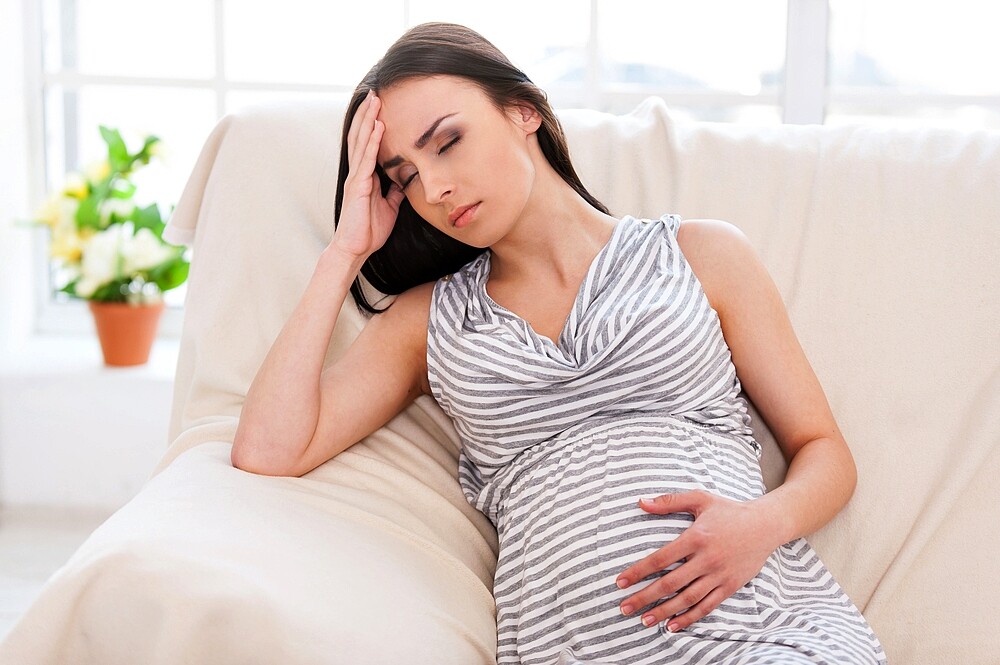“Pregnancy is not a disease!”. But if you suffer from headaches during pregnancy, it feels like what you can do about it, we’ll tell you here.
Especially in the first three months of pregnancy many pregnant women suffer from nasty headaches. This is mainly due to the fact that so many things happen in your body and the hormones go on a rollercoaster ride. Once the first trimester is over, the headaches usually go away by themselves. Nevertheless, headaches can still occur from time to time during pregnancy.
These are the causes of headaches in pregnancy
At the beginning of the pregnancy, the hormonal changes cause headaches, nausea and heartburn. Other factors that can be responsible for the pain are:
- Too much stress
- Insufficient fluid
- Low blood pressure and circulatory problems
- A low blood sugar level
- Neck and back tensions
- Caffeine abstention
- Poor nutrition
- Oxygen and lack of exercise
- Iron deficiency
Here’s what you can do for pregnancy headaches
During pregnancy, do you want to take as little medication as possible? Do you prefer to use proven home remedies? We have put together some tips and tricks against headaches during pregnancy:
- Shut down: Do you find the job particularly stressful right now? Or do you have a lot on your plate in your free time? Then you’d better take it down a gear and put your feet up more often. Slow down for the headache!
- Breathe deeply: Lack of oxygen can be the reason for your headaches. Regular airing – even in the office – or a short walk in the fresh air can help.
- Sleep well: Perhaps you go to bed too late or do not sleep long enough? Then the stupid headache can also come from there. Try to get at least 7.5 hours of sleep a night.
- Drink! Pregnant women should also drink two litres a day if possible.
- Blood sugar in the basement? A low blood sugar level is often the cause of headaches. It is best to always have a small snack with you. Also make sure you eat regularly.
- Caffeine kick: Coffee helps with headaches. Even during pregnancy you don’t have to do without it completely. One or two cups a day are perfectly fine.
- Exercise helps: yoga, swimming, walking, cycling – of course you can also do pregnant sports. This is not only good and healthy, but also stabilizes the circulation and helps against headaches. Just make sure that you choose a sport with a low risk of injury.
Medication for headaches
Even if you would like to do without medication and painkillers during pregnancy, you do not have to torture yourself. Until the 28th week of pregnancy some painkillers are allowed. However, you should consult your doctor or midwife beforehand about which medicines you can take without worrying. Which medicine is suitable for you depends, among other things, on which trimester of pregnancy you are in. Some medicines, such as the vasoconstrictive triptans, can harm your baby and must not be taken under any circumstances.
Paracetamol, Aspirin and Ibuprofen: What can I take and when?
- Paracetamol is allowed during the whole pregnancy.
- Ibuprofen should only be taken in the first two trimesters of pregnancy, not in the last third.
- Aspirin is taboo during the entire pregnancy.
Alternative healing methods
If you often suffer from headaches during pregnancy, alternative healing methods can also help to relieve the symptoms. Which method is the right one for you varies from person to person. Being able to help:
- Relaxation methods (muscle relaxation, autogenic training, biofeedback)
- Acupuncture
- Acupressure massages
- Essential oils (peppermint, also as tea)
- Warm footbath
- Cold or warm washcloth
Not every measure has been scientifically studied, but that does not mean that they cannot help you and reduce your headaches. The best thing is to just try them.
When should I go to the doctor with a headache?
If you suddenly get regular headaches, see flashes or stars, the pain is very strong and your perception is disturbed, then please go to the doctor quickly and have this clarified. Very high blood pressure is often to blame for the pain, which in turn can be dangerous for mother and child and should be treated and observed immediately, as high blood pressure can be a sign of pregnancy poisoning (pre-eclampsia). In addition, suddenly occurring severe headaches during pregnancy can be a sign of a stroke or vein occlusion. Fortunately, such complications are very rare. Nevertheless, it is good to know when it is best to see a doctor.

